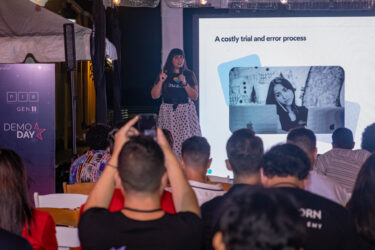The policies of the tech community are obviously not with out controversy, but here are five ways that the community is attempting to make a positive impact on society.
We can, and do, and should – all have our differences with the tech community. But it’s easy to by cynical, and if cynicism were all we could muster then it would just become the norm; and in so doing relinquish its raison d’etre. So I’d like to tot up some points for tech during what has been difficult times for progress.
In general, I think there’s an implicit – or unspoken maybe – good ‘feeling’ about tech. If people have attacked tech in the past then others are quick to point to its positive influence – during the Arab Spring, for example. But then the daily news cycle takes it’s toll – tech gets bogged down in disagreements about AI or links to the CIA or woeful diversity statistics. These are discussions in which people are rightly and passionately engaged, mostly in an angry capacity.
Read More: CIA ‘Siren Servers’ can predict social uprisings 3-5 days in advance
But, despite the fact I’ve contributed relatively critical articles to the aforementioned topics, broadly, I also feel pretty good about tech. Perhaps squeezing two qualifiers into that final clause betrays a tentative approach to the argument I’m about to put forward. And that’d probably be right, it can still all veer off course and the enlightened sheen the industry currently has could become weathered. But, generally, if feelings are good, then it’d be impolite not to say so.
There are two things to keep in mind when the hype hits the fan. Firstly, for a “phenomenon” or “revolution” as big and far reaching as “tech”, it’s not possible for everything to go well all the time. That’d be asking for too much. But that’s not to say we should release the tech industry from the tyranny of our expectations. No way.
Secondly, as these questionable stances and movements present themselves, what should be guaranteed is healthy discourse. And this, I think, is happening, especially in comparison to other spheres: The president of the US and his cabinet spout untruths while new US government policy is announced on f*@#ing Twitter (honestly, I don’t even… what?!).
The UK voted to leave the EU via more untruths, and now has a majority-less prime minister, which means the rest of Europe has to spend its time boxing Legion. China and North Korea are not cool, again… S’pose Russia is playing fair, at least.
While this blustering vortex swirls around dipping tech stocks, the debates on tech’s downfalls seem to me to have been constructive: AI is a debate we need to have, tech companies are releasing diversity figures and improvement plans, and reporting revealed Google’s CIA links often amounted to the CIA hacking lots of android devices (not good, but one of them things on a ‘need to know’ basis).
Read More: CIA physically installed NightSkies tracking beacon in factory-fresh iPhones: Assange
In fact, one might argue that tech is the last place where a relatively effective public discourse can happen. How wonderful it is to be us.
Added to this we have a string of what I would consider to be positive thrusts and parries from the tech industry worthy of mention for their positivity alone.
Privacy
Security services want our data which is understandable, they have difficult and important work to do. If they weren’t proposing ways in which they could do their job better or quicker, one could reasonably accuse them of negligence. But this request does cross a line which needs justifying – so while one might appreciate the request, it’s a request that should be declined and the reasons for doing so defended.
Read More: CIA-backed, NSA-approved Pokemon GO users give away all privacy rights
And it’s the tech industry which is behind the public, adding real ballast to that defence. How I enjoyed watching the CEO of a phone company publicly telling the FBI to go take a hike. Take a bow, Tim Cook. Take a bow. +1
Anti-Terrorism
Then we have YouTube, who’ve parked themselves right in the middle of anti-terrorism efforts, proposing to redirect people who search for terrorist content to anti-terrorist content. There are justified reservations around the approach, like if you restrict the way people interact online then you also restrict the ability of outreach organisations to find and converse with these people.
Read More: How Tech Companies are Combating Terrorist Propaganda
But the public and politicians have asked for something from the tech community more broadly, and big names have stepped up to the plate. I think it’s important to acknowledge some basic willingness on the part of companies like these. If you look to other sectors I’m not so sure you’d witness an affinity for responsible behaviour in the same way. +2
Transgender People in the Military
On the prior two points you might reasonably repudiate the positive effect of the tech sector, on the grounds that their stance on each is also self-serving. I wouldn’t disagree, but self-serving actions don’t necessarily negate positive impact. And I would cite the tech industry’s reaction to Trump’s policy on transgender people in the military as an example of a stance taken for the stance’s sake.
Read More: Indonesia bans gay emojis as govt quietly ‘weakens’ anti-corruption agency
After Trump announced his policy, the tech community planted their flag firmly on the side of LGBT rights despite being nothing to do with the military. It was a genuinely lovely moment; Pichai, Zuckerberg, Altman, Benioff, Cook… basically between 10am and 2pm pretty much the whole of Silicon Valley straightened their backs and broadened their shoulders behind the LGBT community. +3
Facebook on Fake News
This is perhaps slightly more contentious, but hear me out. After the 2016 presidential election, an angry and incredulous public looked to Facebook to do something about fake news. Despite not being overly keen on Facebook’s decline from social media platform to advertising platform, I really admired Zuckerberg’s class during this situation.
Read More: Facebook to rely on unnamed third-party fact checkers for fake news
It would have been so easy to succumb to public outcry and issue a knee-jerk reaction, this would have probably involved cutting websites from News Feed which were suspicious or a bit too extreme. Suspicious websites might have been identified by their age or lack of mature code base, and thus the policy would have crushed genuine startups. And “too extreme” might’ve been defined as ideas on either tail of Facebook’s (very left-leaning) political bell curve, which would have closed genuine debate, as well as the fake stuff. Either would have eventually been counter-productive.
Plus, we’d have been asking an unelected, private body to create an algorithm or team which decides what information we ingest. People were asking for 1984 at this point, no hyperbole intended.
Zuckerberg initially rejected the premise of the argument. Which was followed by a post which displayed his deep reflection and principled stance on the topic, coupled with an explanation of the complexity of forming a solution. Followed by another post a few days later where he shared more of his thinking as it developed. He stopped and thought, unswayed by the prevailing edifices, and engaged the public in an almost philosophical discussion.
Eventually he and his team came up with an approach which, at it’s core, came down to Facebook and its users forming a dialectical understanding of the problem and fixing it together. He ushered an angry outcry through to a reasoned and responsible solution pretty much single-handedly. +4
Improvements in Measuring Poverty
This is an example of a story not about Silicon Valley’s big names. A reminder that aside from the tech CEOs, who can easily grab headlines, just having more technology is a bit bloody cool.
Not long ago, in trying to figure out poverty levels in the developing world, researchers would go out into the areas they wanted to study with pen and clipboard to gather data. I’m sure you can imagine the flaws that resulted.
Read More: Scholarship seeks outstanding female students in Middle East, Africa for competition
Now, the World Bank sends its researchers out with tablets, to take and store the data real-time, saving on costs. The GPS tracking takes care of where they took the data, and the tablets allow them to conduct interviews adding qualitative data to the quantitative.
They can hand out phones – with credit supplied to improve lives and maintain engagement – allowing cheaper and more frequent self-reported data about living conditions. Smart Survey boxes are also being installed to measure energy quality and availability.
This is part of the UN’s Sustainable Development Goals to end extreme poverty by 2030. We can’t end it if we don’t know where it is and how bad it is. And tech is helping us to find out both. +5
It’s good to be critical of tech, not in spite of its potential; because of it. But give credit where credit’s due.











